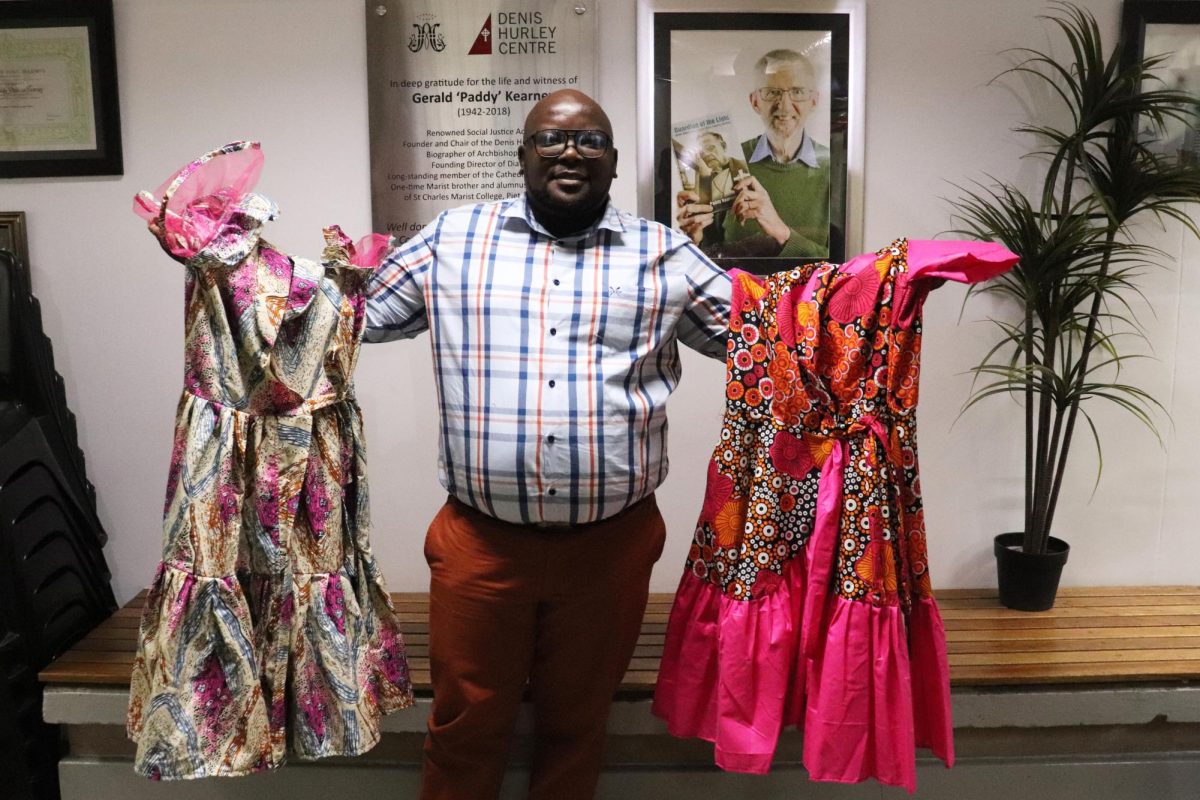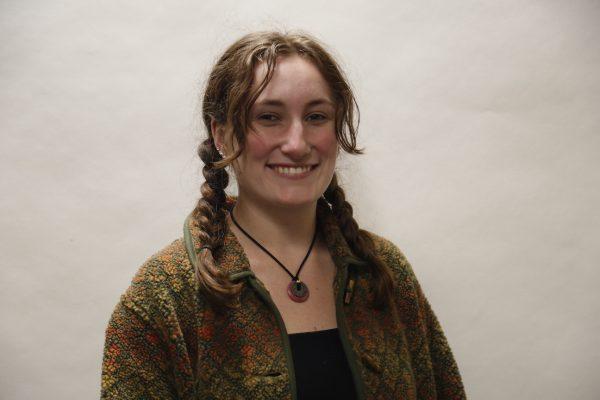Durban, South Africa – Chacko Shabalala’s story is one that keeps staff at the Denis Hurley Centre focused on their mission to help men living on the streets in Durban.
Growing up in a relative’s home where he did not feel loved, Shabalala turned to drugs and alcohol when he was just 13 years old. From there, his life spiraled. After four years of living on the streets, he found his way in 2016 to the Denis Hurley Centre, a nonprofit organization in central Durban dedicated to assisting people in need of housing, rehabilitation and employment.
“We used to come for breakfast and take a shower, [get] lunch, and also there are social workers who offer you help, so I started applying [for rehab],” Shabalala said.
Founded in 2015, the Denis Hurley Centre is named in honor of Denis Hurley, a beloved Catholic archbishop and anti-apartheid activist who served in Durban from 1947 to 1992. Focused on serving Durban’s unhoused population, the center counts drug and alcohol rehabilitation among its many services.
Raymond Perrier, former director of the Jesuit Institute South Africa, has been the director of the Denis Hurley Centre since its opening in 2015. Perrier said Hurley dedicated his life to fighting for those who are most in need in society, so that’s what the center strives to do for the unhoused of Durban. According to Perrier the Denis Hurley Centre worked with the Human Sciences Research Council (HSRC) to conduct a census of unhoused people in central Durban and immediate surrounding areas in 2016. The study found 4,000 unhoused people in central Durban. Perrier estimated that this number has since grown by 50% to about 6,000.
Over the next five years, Shabalala relapsed twice until a social worker at the Hurley Centre referred him to the Napier Centre, a residential after-care facility in a rural area northwest of Durban. Perrier said long-term after-care treatment for those who have already completed the center’s regular eight-to-12-week program is key for the men they work with.
“The big issue is what happens to somebody who’s been on the streets, they leave the rehab center, and then they’re back on the streets, and so the temptation to relapse is very high,” Perrier said.
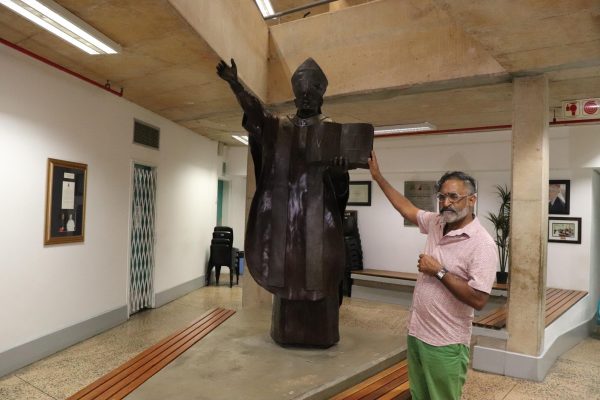
At Napier, Shabalala said he was provided with the tools he needed to prevent future relapses. After spending six months there, Shabalala now operates a clothing business, using skills he learned at the facility.
“They equip me with business management skills, sewing skills, of which I live my life using those skills,” Shabalala said. “I run a business now, I sell dresses and shirts, trousers, whatever the customer wants.”
Shabala credits the Hurley Centre for supporting his journey from addiction to recovery.
“I understand that somehow God sent me again to this place,” Shabalala said, “because now I have a good relationship with Denis Hurley Centre. Whenever they need me to go and motivate somewhere, or to go and do a drug awareness somewhere, they know I’m just a phone call away. So we kind of like working together now. They are the ones who used to support me.”
Where it began
Hurley’s contemporaries included Anglican Archbishop Desmond Tutu and Beyers Naudé of the Dutch Reformed Church (DRC) in South Africa. All three members of the clergy were active opponents of apartheid and advocated for social justice through the church. A photo of Hurley, arms linked with other religious leaders, marching in protest against the apartheid government, hangs on a wall in the center.
Hurley advocated for inclusivity of all religions in South Africa and collaborated with Muslim leaders in the Durban community. That collaboration is evident in the strong ties between the Denis Hurley Centre and adjoining Emmanuel Cathedral and the nearby Juma Masjid Mosque, also known as the Grey Street Mosque.
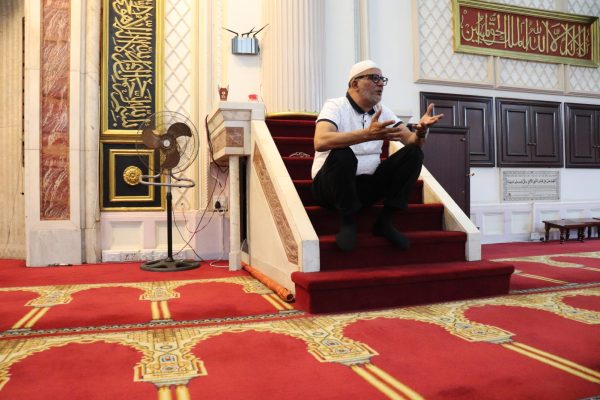
PHOTO: HANNAH PAJTIS ’26/THE HAWK
The Grey Street Mosque gave the first donation to the Denis Hurley Centre nearly a decade ago to aid in its creation, according to Mohamed Khan, a member of Juma Masjid Mosque and the Islamic Propagation Centre International.
Leaders of both communities have also been welcomed into the other’s worship spaces, as both Khan and Perrier pointed out.
“[Hurley] was the first bishop to be invited to speak at Friday prayers at the mosque,” Perrier said. “He invited Muslim leaders to come and speak in the cathedral.”
One of the ongoing collaborations between the Catholic and Muslim communities is a feeding scheme, which takes place in a courtyard near the cathedral and mosque. There, volunteers of all religions prepare food for the unhoused.
“The mosque and the church feed together,” Khan said.
Serving with dignity
The feeding scheme is part of the decade-old Nkosinathi Project, with Nkosinathi translating to “God is with us” in Zulu. The project offers breakfast and a cooked lunch four days a week, serving over 14,000 meals a month, with the help of donations from local traders as well as cash donations from the church and mosque.
The way the scheme is run is designed to prioritize the dignity of the people being served. There are benches for those to sit on as they wait to be called for the meals, which are served on plastic plates and in tin cups. Because there isn’t enough seating for everyone, they eat in shifts, but each person is allowed time to sit to eat their meal.
One of the signature features of the feeding scheme is its offering of halal food so that unhoused Muslims can partake as well. Perrier noted the significance of a halal kitchen in a Catholic space, which came about when leaders at the mosque asked for help in setting up their own feeding scheme for Muslims.
“We said, ‘Well, that’s fine, but tell us how to make ours halal, and then we’ll work together,” Perrier said. “Being halal means homeless guys who are Muslim get food that’s appropriate for them. We often have Muslim volunteers, so they’re not cooking something which they feel uncomfortable with. But also, this is the cunning part of it, most of the butchers around here are halal butchers, so they then give us spare meat because they’re invested in the program.”
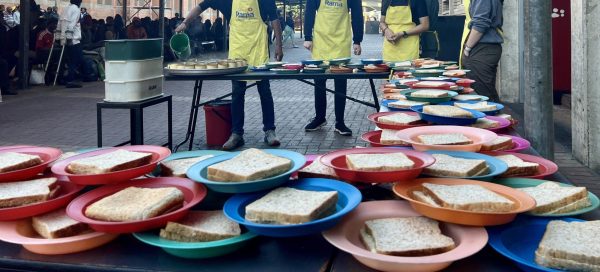
‘It changed my life’
Tracy Bolt, a resident of Durban, began preparing meals in the Emmanuel Cathedral for the unhoused in 2006, and then started working with the Denis Hurley Centre on the Nkosinathi Project when it opened.
The Denis Hurley Centre gave her the opportunity to support her son and get off of the streets.
“It changed my life, and I’m very happy in this place, ” Bolt said.
Mariam Ali, a law student at the University of KwaZulu-Natal, volunteers with the Nkosinathi Project. She said volunteering introduces her to new people and allows her to interact with those from various religious backgrounds.
“With [unhoused] people, nobody really stops to actually talk to them and take time to know what’s going on in their lives,” Ali said. “I think that the best part is just talking to people.”
Other elements of the Nkosinathi Project include providing showers, clean clothes and a space where the unhoused can receive care without the fear of being penalized. Referrals are also given to Usizo Lwethu Clinic, the Hurley Centre’s in-house primary health care clinic that grants free medical care to the unhoused and provides testing and monitoring regardless of background. Established in 2006, the clinic started as an initiative of the Catholic Archdiocese of Durban AIDS Commission.
Perrier said the Nkosinathi Project bridges a connection from the unhoused to the organization, which allows them to provide more personal care.
“Seeing people regularly, them seeing us regularly, helps them to trust us and to get to know us,” Perrier said. “This means we can then start talking about drug rehab, about legal issues, about getting people into training, getting people into work, and most importantly, connecting people with their families.”
Perrier said the Denis Hurley Centre aims to replicate the legacy and humility that Hurley left behind, now 20 years after his death in 2004.
“A phrase we often use is just to be a voice for the voiceless, to speak out for those whose voices don’t get heard,” Perrier said.














































